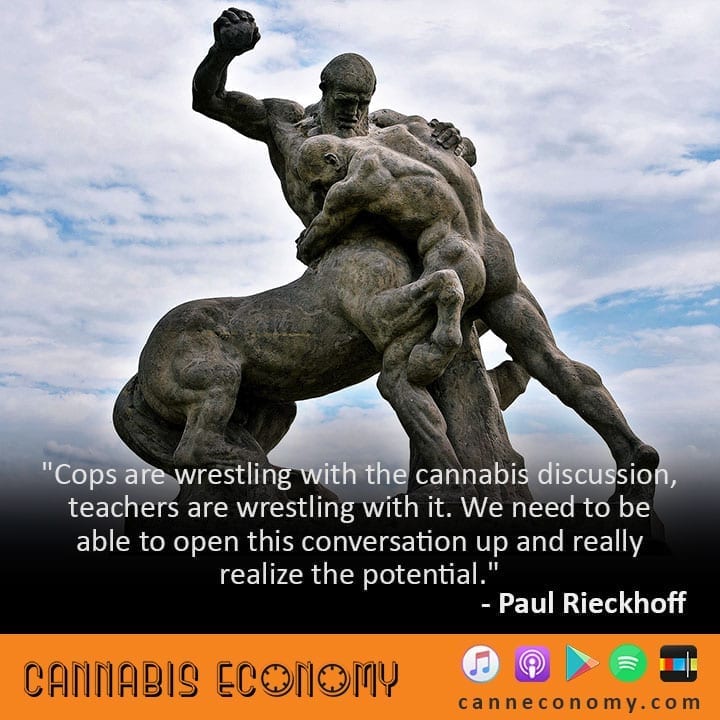
Ep. 390: Paul Rieckhoff, IAVA
December 22, 2018Paul Rieckhoff joins us and shares the potential for the Cannabis industry to be a massive job opportunity for veterans: “Think about the economic impact here, and think about the economic impact for veterans. Because veterans are four times more likely to be small business owners, they’re extremely entrepreneurial, and we think this is going to be the green revolution, the green industry is going to be a source of jobs.”
Transcript:
Speaker 1: Paul Rieckhoff joins us, welcome to Cannabis Economy. Download episodes on canneconomy.com, that's two Ns and the word economy, or wherever you currently get your podcasts. First, a word from MedMen, and then Paul Rieckhoff.
MedMen continues to expand its footprint on the cannabis landscape, opening new stores in Los Angeles, Las Vegas, and the iconic 5th Avenue in Manhattan. They've also opened a 45000 foot high tech cannabis cultivation and manufacturing facility in Nevada. The company has reached a one billion dollar valuation, making it the country's first cannabis unicorn, and it's just the beginning. Learn how MedMen is building the future of cannabis today at medmen.com.
Paul Rieckhoff: But yeah, no more free interviews. That's the thing. You're working your tail off, right? You talk to somebody like me, I got microphones. Usually it's with cameras. And what do you get paid? Not much.
Speaker 1: Yeah, well first of all, thank you for coming in.
Paul Rieckhoff: Thank you for having me.
Speaker 1: Good to see you, thank you for coming all the way from the distant land of Yonkers, which I have a huge affinity for, growing up in [inaudible 00:01:06]. Yonkers is like reborn, man. Yeah, rebirth.
Paul Rieckhoff: Yeah, which is cool. But yeah man, we were just saying about media. I've been doing a lot of media interviews over the last 14 years, and when I go back to [inaudible 00:01:19] just outside of Yonkers, people are like, "Oh man, you must be rich. You're on TV all the time." And I say, "Shit, I don't get paid for any of those interviews. I'm out there advocating for the cause. I'm lucky if I get an Uber back home.
Speaker 1: You got paid more in the service than out of the service, you know what I mean? And you don't get paid a lot in the service.
Paul Rieckhoff: And overseas it's tax free, which is yeah, when you're deployed that's a big secret. Yeah, yeah, yeah. But nevertheless, this is, it's great to have you here man, the timing's perfect. We got a lot of momentum, and we're finishing up a huge year on cannabis on all our advocacy issues, but it's really good timing to have you down here to talk now.
Speaker 1: Let's dive in on that. Let's talk about what we did, and by we I mean you, in 2018 and how that leads into 2019. Because I saw you right at basically the beginning, 2018 on we just passing each other on the hill, and you had a nice printout for me, right?
Paul Rieckhoff: Yeah, yeah. IAB has been around for 14 years now. Iraq and Afghanistan, [inaudible 00:02:20] in America, we founded it in my studio apartment in the lower east side with a MySpace page and some pissed off vets who wanted to make change. Fast forward 14 years later, we've got about 400000 members around the globe. They're all post 911 vets, so men and women who served since 9/11. There's about three million overall in our community, so this is the next generation of vets, and for 14 years we've been asking them what are the issues you care about?
And really four or five years ago, we started to see cannabis really emerge. I think what was most interesting was, it cut across partisan lines. There was no partisan affiliation, there was no geographic affiliation. Our community is I think post partisan. They want to get shit done. And they don't care who does it now. And the break down is, the highest percentage of our members are republicans, and then democrats, and then we have a huge percentage of libertarians, and a lot of people who are unaffiliated and independent, so I think they look at issues, not really parties. And what we saw over time was on medicinal, they were in support of medicinal years ago by over 80 percent. And recreational been really accelerating I think even ahead of where the public is.
Read the full transcript:
Become a member to access to webinars, quarterly reports, contributor columns, shows, excerpts, and complete podcast transcripts
